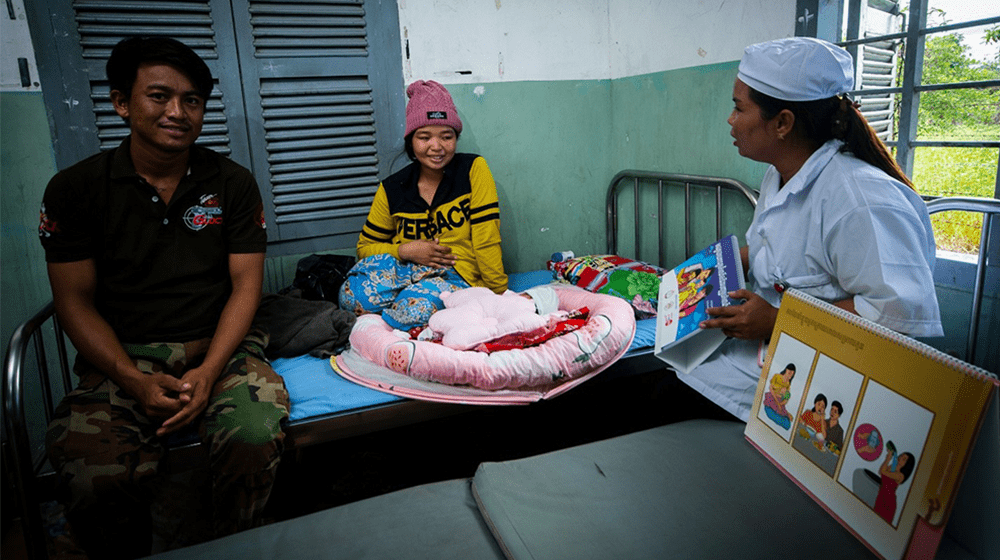This year marks the 30th anniversary of the International Conference on Population and Development (ICPD) and the UN Population Fund’s (UNFPA) presence in Cambodia.
The ICPD transformed global thinking on population and development by focusing on key values, including addressing inequalities, prioritising human and reproductive rights and empowering women and girls as key pillars to sustainable development.
As we observe World Population Day 2024, themed "Inclusive data, resilient populations: building an equitable future for all", we reflect on three decades of development efforts and Cambodia’s commitment to implementing the principles of the ICPD.
1994 marked a pivotal moment for Cambodia. In that year, it was a country where 70 per cent of the population lived below the national poverty line. Women were dying during childbirth (maternal mortality) at a rate of over 900 per 100,000 live births. Access to basic healthcare and education across the country varied, with much of the population not reached.
From 1994 until now, the change over the past 30 years has been a testament to improved services and support for the people of Cambodia. Maternal mortality has been reduced from the 1994 figure of 900 to 154 per 100,000 live births in 2024, according to the 2021-2022 Cambodia Demographic and Health Survey (CDHS).
The percentage of the population using modern contraceptives stands at 45 per cent in 2024, compared to 19 per cent in 1995, as noted in the CDHS. Furthermore, women who have experienced physical, sexual or emotional violence by an intimate partner now stand at 20.7 per cent, compared to 25 per cent in 2000 – no data was being collected back in 1994.
Additionally, the completion rate at the upper secondary level has improved from 4.6 per cent for boys and 2.1 per cent for girls in 1998 to 17.4 per cent for boys and 17.8 per cent for girls in 2019, as per the census.
Challenges remain
These achievements are commendable and demonstrate the government’s commitment to fulfilling the promises made in 1994 to the principles of the ICPD.
Despite these great achievements, there remain many challenges. Changes have been uneven across different groups and regions, with some communities continuing to face challenges in accessing healthcare, education and economic opportunities. The rate of reduction in maternal mortality has slowed since 2016, indicating areas where further efforts are needed.
The theme of this year's World Population Day highlights the role of inclusive data in understanding and addressing these disparities. Comprehensive, safe, and inclusive data collection and analysis are crucial in informing policies that address the needs of all population groups.
Moving forward, there is a need to prioritise support to ensure that all population groups have equal access to healthcare and opportunities, ensuring that no one is left behind. Addressing differences in healthcare access, particularly for rural and remote communities, is essential. Enhancing opportunities across all sectors of society is another critical step.
Additionally, addressing the urgent needs of Cambodia’s youth, who require access to adequate education and healthcare, is necessary to ensure that they can both benefit from and contribute to the country’s development.
Prioritising the removal of gender discrimination in policies, laws and society, including ending violence against women and girls, is vital to ensure that they can equally participate in and reap the benefits of the nation’s development. Finally, ensuring that economic growth translates into positive improvements in the quality of life for all Cambodians remains a key goal.
These efforts involve collaboration between the government, civil society, international organisations and individuals. The UN, including UNFPA, continues to support Cambodia's development efforts, advocating for policies that align with international standards and address individual needs.
The Cambodian government has established a Special Committee on the ICPD Plan of Action, which ensures that the country’s commitments in Nairobi are planned, implemented and monitored to achieve three transformative results.
First, the goal is to achieve zero unmet need for family planning information and services, along with the universal availability of quality, accessible, affordable and safe modern contraceptives. Second, there is a commitment to ensuring zero preventable maternal deaths and addressing maternal morbidities, such as obstetric fistulas. Third, the objective is to eliminate sexual and gender-based violence and harmful practices.
Looking ahead
As we reflect on 30 years since the ICPD, we recognise both the positive achievements and changes that have occurred, as well as the profound work that remains. Our focus is on evidence-based policies and inclusive strategies that address the needs of all population groups.
By using comprehensive data and fostering partnerships, we can work towards a Cambodia where development benefits all sectors of society. The path ahead involves continued commitment, ongoing assessment and adaptability to ensure that efforts address the evolving needs of all the people in Cambodia while upholding commitments to the international standards contained in the ICPD.
Bin Troachhey is the Minister of Planning of Cambodia and Sandra Bernklau is a representative of UNFPA Cambodia. The views expressed by the authors are their own.


